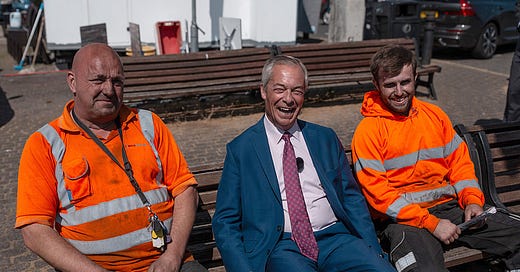Today we have the second of our two election post-mortem posts following my review on Saturday. This one is a guest post from Professor Jane Green and Marta Miori and takes an in-depth and data-driven look at the Reform vote and how last week’s results have changed the political landscape.
Jane is Professor of Political Science and British Politics at Nuffield College, Oxford and the Co-Director of the British Election Study, which runs large, gold-standard, panel surveys to help researchers understand changing patterns of party support and election outcomes. She is also President of the British Polling Council and an elections analyst for ITV News.
Marta is a doctoral researcher in Political Science at the University of Manchester, specialising in electoral behaviour, British politics, and Scottish politics.
There aren’t many elections that change assumptions about British politics. But these ones did. There is now a great deal more uncertainty about what may happen in the coming years.
In some respects these local elections resembled previous ones. They tend to amplify protest against incumbents. In this case the incumbents were both Labour and the Tories. Minor parties did better than their polling would have suggested, as they usually do, and so fragmentation is somewhat amplified. Usually many voters who stay at home in local elections, or vote for someone else to send a protest, return to one of the large parties in a general election. One would still expect this to boost the Labour vote in a general election, although that may be challenged by an extended period of bleak economic pessimism.
The big change is on the right. Reform has broken through a ceiling and can now argue that voting for it is not a ‘wasted vote’ in Britain’s electoral system. Absent something transformational happening, it’s the best-placed party on the right against parties on the left. This was the assumption-changing moment of the 2025 English local election results, and the point Nigel Farage will make repeatedly, as long as he retains this level of support.
In this post we set out our early thoughts about what conclusions we can and can’t yet take. Reform still face important challenges, for instance co-ordination could be as strong on the liberal-left as it was in 2024, but the Conservatives face the greatest threat in their history. Their response will determine Labour’s future too, and whether we are headed for an even more fragmented political system or one that repolarises around different parties.
What the results showed for Reform
Sam gave a run-down of what the results showed for all the parties on Saturday. Reform won 677 Councillors, two regional Mayors and a new Member of Parliament. The party outperformed its national polling in the Projected National Share (30%) and National Equivalent Vote (32%), the BBC and Rallings/Thrasher estimates of the vote shares if the local elections had been fought everywhere.
In the following graph we compare Friday’s council vote shares to those achieved by UKIP and the Brexit Party in local elections against an average of their polling between 2012 and 2025 (with grateful thanks to Colin Rallings).
It also shows general election vote shares for UKIP, the Brexit Party, and Reform UK (as well as the European Parliament share for the Brexit Party in 2019).
You can see the degree to which the 2025 local elections were a breakthrough for Reform. Furthermore, whereas UKIP and the Brexit Party struggled to translate their local and European Parliament successes into general election vote shares, because large proportions of their voters returned to the Conservatives in general elections, that assumption is now seriously in question.
Keep reading with a 7-day free trial
Subscribe to Comment is Freed to keep reading this post and get 7 days of free access to the full post archives.







